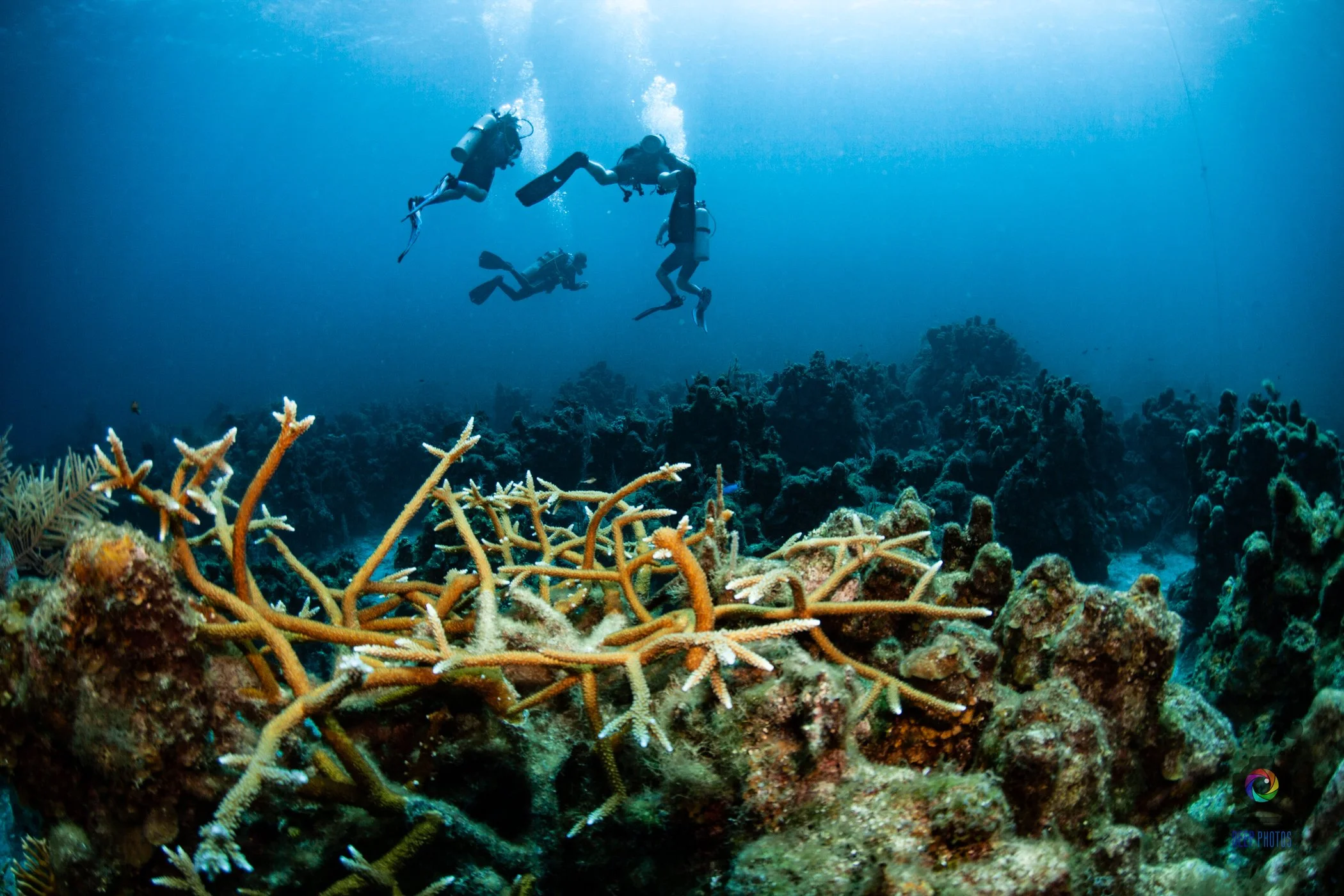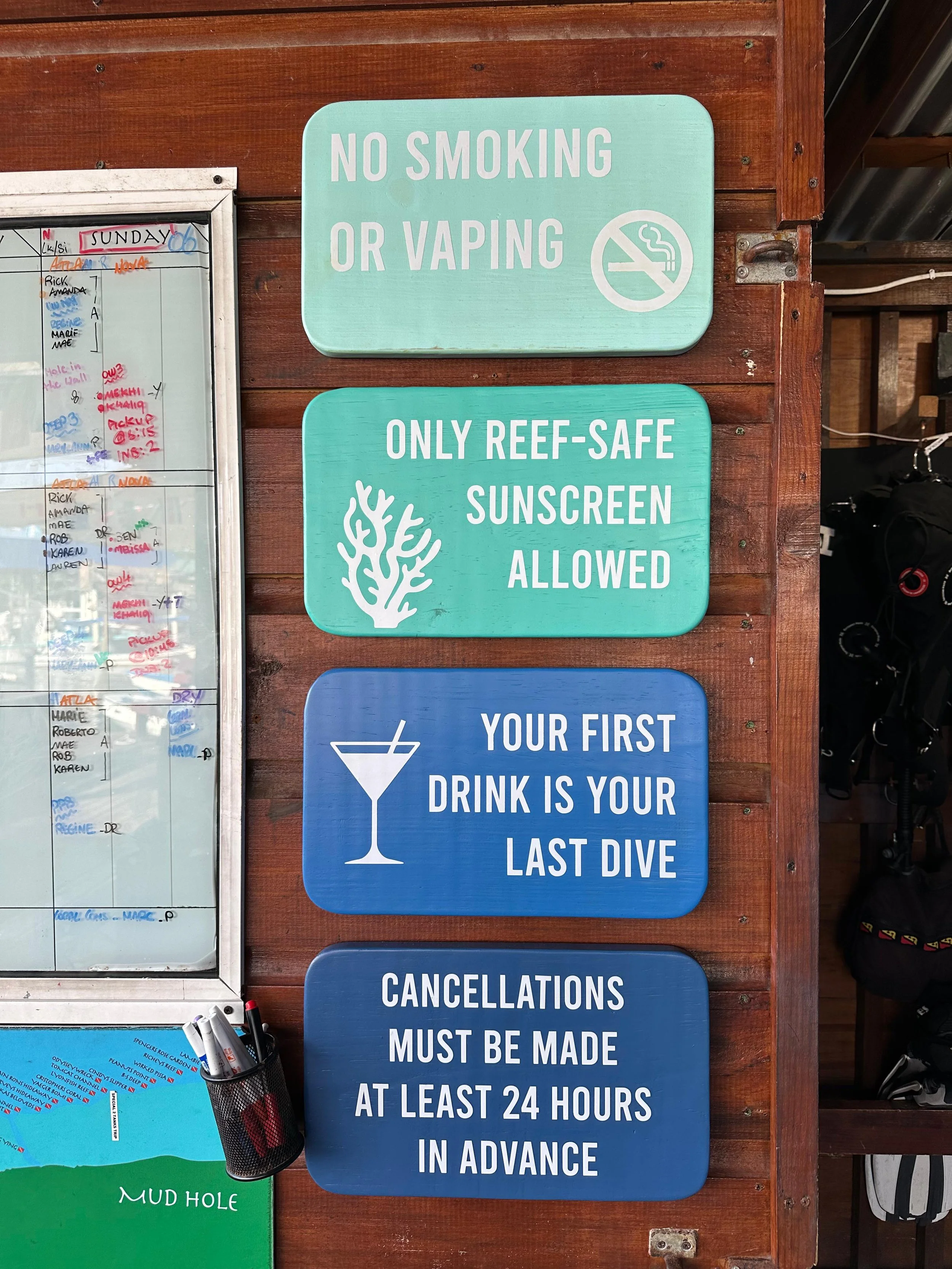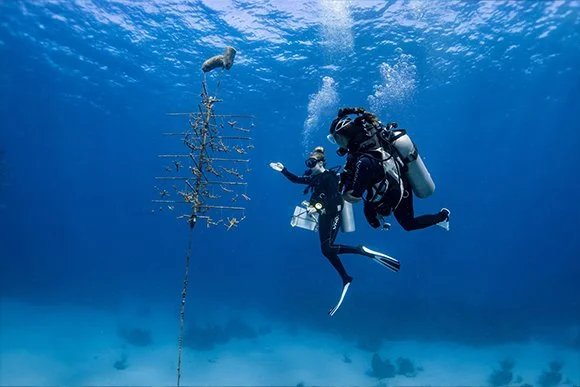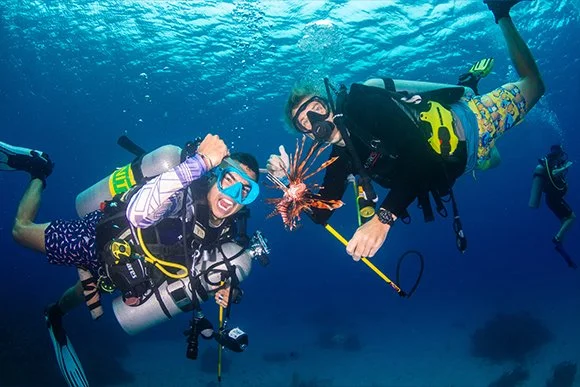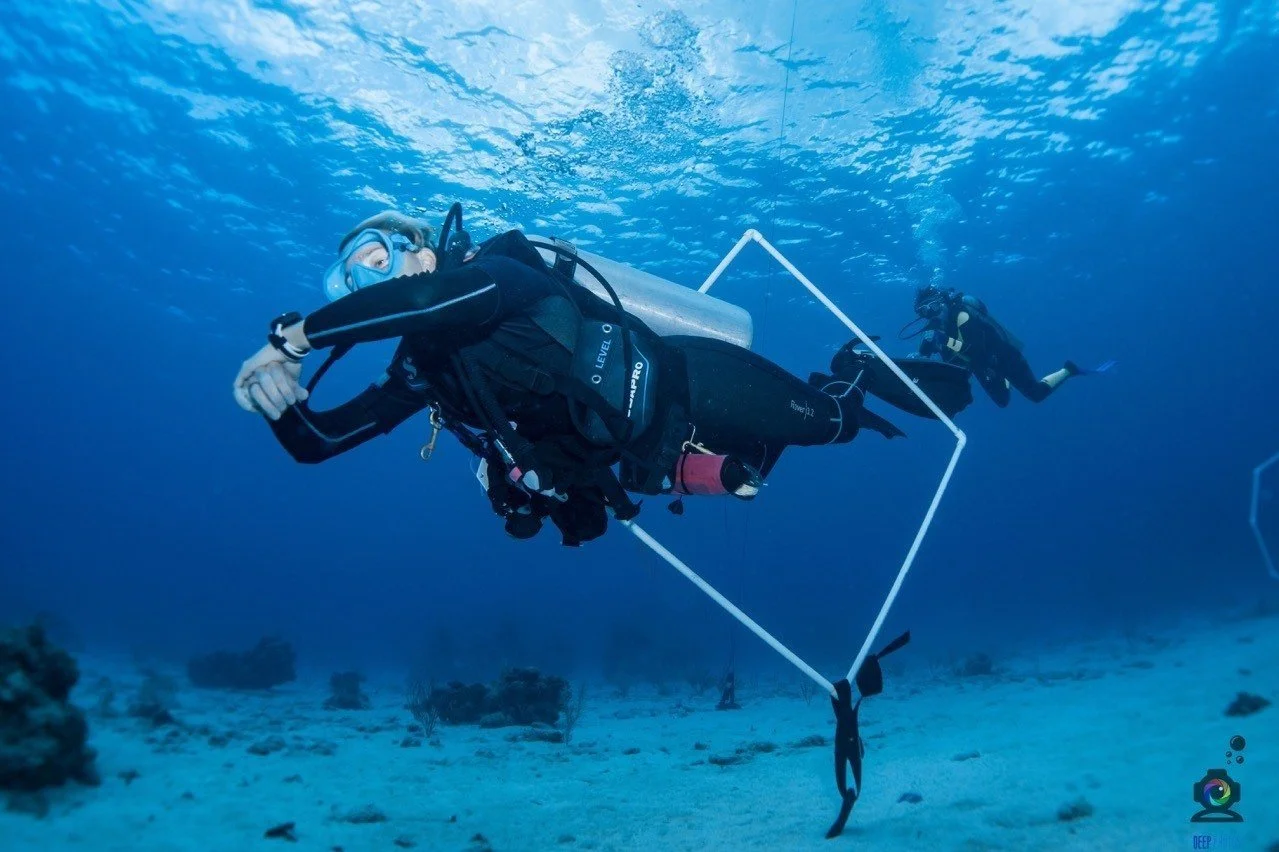Why Should You Use a Reef Safe Sunscreen in Roatan?
No matter what you do, don’t forget your sunscreen! This is great advice for vacationers but can be devastating for our coral reefs.
Roatan has the second-largest barrier reef in the world, which means this reef is home to a huge number of corals and significant marine biodiversity. It also means that our island is a popular tourist destination, receiving over 1.6 million visitors each year. If you’re wondering if you should use a reef-safe sunscreen in Roatan, the answer is yes!
Roatan Divers is deeply committed to protecting the ocean, and we are proud to say that we are banning non-reef-safe sunscreen from our operations.
Here’s what you need to know about using reef safe sunscreen.
Why Use Reef Safe Sunscreen?
Our new sign to remind divers of our latest policy: only reef-safe sunscreen is permitted to help protect our reefs.
Traditional sunscreens are extremely toxic for coral. To understand why, let’s start with a brief explanation of what corals actually are. A coral is not a plant, nor is it an algae. In reality, corals are animals that live in communities. What we think of as "a coral" is actually hundreds to thousands of individual animals called polyps. These polyps build the shapes we recognize as corals using a calcium carbonate base. Thus, they can make large, beautiful structures that can come together to form reefs like the Mesoamerican Barrier Reef (MAR), where Roatán is located.
So, what does this have to do with sunscreen? Sunscreens traditionally contain ingredients that cause significant stress to the polyps, resulting in bleaching, damage to their DNA, deformities in larvae and babies, abnormal skeletal growth, and disruptions to their reproductive cycle. These ingredients, oxybenzone and octinoxate, have been consistently shown in studies to be detrimental to coral health. Danielle Olson, writing for Ocean, a publication within the Smithsonian, explains: “A later 2022 study of anemones, the coral’s close relative, determined one reason why. When anemones encounter oxybenzone in the presence of sunlight they attempt to rid themselves of the chemical by slightly altering its chemical makeup, but in the process, they end up making a lethal toxin. The new molecule builds in both the anemone tissue and in the anemone’s symbiotic algae where it then wreaks havoc and bleaches the anemone.” The science is clear: traditional sunscreens harm our fragile coral reefs.
Is there really enough sunscreen coming off of tourists to cause this type of coral damage? The truth is, it is difficult to say. What we do know, based on a study conducted by the American Chemical Society, 14,000 tons of sunscreen enter the world’s oceans every year. But this sunscreen isn’t only coming off the bodies of people actively swimming in the ocean. It also arrives via runoff water from beach showers, and so on.
What is a Reef Safe Sunscreen?
To help protect the corals, choose sunscreens made with mineral-based ingredients like zinc oxide and titanium dioxide (non-nano), both considered “reef-safe” or “reef-friendly”. But don’t just look for the label, make sure to check the ingredients list as well.
Wondering if your favorite sunscreen contains chemicals harmful to corals? Check the ingredients list on the back of the bottle and watch out for the following substances:
Oxybenzone (Benzophenone-3, BP-3) – disrupts coral reproduction, causes coral bleaching, and damages coral DNA.
Octinoxate (Ethylhexyl methoxycinnamate) causes coral bleaching and toxic to seagrass.
Octocrylene – causes metabolic distress in corals and deformity of developing fish larvae.
Benzophenone (a breakdown product of Octocrylene) – known carcinogen, endocrine disruptor and a patented herbicide that induces coral bleaching and kill seagrass. Source:
Homosalate – is a teratogen from sea urchin and fish to humans.
Avobenzone – is toxic to algae, can cause coral to bleach, and can cause blindness in developing fish larvae.
What Chemicals are on the HEL List?
The HEL (Haereticus Environmental Laboratory) List is a compilation of chemicals known to be harmful to the environment, particularly aquatic ecosystems
Any form of microplastic sphere or beads.
Any nanoparticles like zinc oxide or titanium dioxide - nanoparticles are extremely tiny particles and can be ingested by corals
Oxybenzone
Octinoxate
4-methylbenzylidene camphor
Octocrylene
Para-aminobenzoic acid (PABA)
Methyl Paraben
Ethyl Paraben
Propyl Paraben
Butyl Paraben
Benzyl Paraben
Triclosan
Homosalate
Octisalate
Butyloctyl salicylic acid
Propylparaben
What’s better for the ocean is also better for your health, especially when it comes to avoiding chemical sunscreens, but no sunscreen can substitute the natural solutions like:
Hats
UV-Protective rashguards
Avoiding direct sun exposure during the highest UV hours
Best Reef Safe Sunscreens on the Market
We know it can be overwhelming trying to pick out complicated ingredients buried in a list full of unpronounceable words, so we’ve curated a list of 10 brands considered to be reef safe (in no specific order):
Stream2Sea Coral Care
Hello Bello Mineral SPF 50 Sunscreen Lotion
Raw Love SPF 35 All-natural Mineral Sunscreen
Thinksport SPF 50 Sunscreen
All Good SPF 30 Sport Sunscreen Lotion
Babo Botanicals SPF 30 Clear Zinc Lotion
Suntegrity Natural Mineral Sunscreen
Badger SPF 30 Unscented Sunscreen Cream
Raw Elements SPF 30 Certified Natural Sunscreen
Loving Naturals Clear Body SPF 30+ All-natural Sunscreen
For a quick look at sunscreens that contain some (or all) of the coral-damaging chemicals, check out this graphic from Save the Reef.
Roatan Marine Park’s Coral Efforts to protect the reef
Roatan is a scuba diving haven in large part due to its placement on the Mesoamerican Barrier Reef. Our corals are incredibly important for marine health, as about 25% of all marine life lives on coral reefs, but they are also important for our local, tourism-based economy. The Roatan Marine Park works tirelessly to research, protect, and propagate the coral reef around the island through scientific programs, marine patrols, and coral fragmentation initiatives.
The Roatan Marine Park is actively seeking signatures to pressure the Honduran government to ban these harmful chemicals and protect this fragile ecosystem.
Help Roatan Ban Non-Reef Safe Sunscreen
You can sign their petition and learn more about this initiative here.
Specialize in Reef-Saving Skills
RMP Coral Restoration
Roatan Divers is a proud purveyor of the Roatan Marine Park’s Coral Restoration Certification, which gives you the chance to get hands-on with the corals. The Coral Restoration Project was designed to conserve and restore threatened coral species in Roatan’s reef. Fragments of Opportunity are collected from multiple genotypes of both Elkhorn and Staghorn Corals, which are then attached to trees in the Coral Nursery until they are able to be out-planted on the reef.
RMP Lionfish Hunter
Lionfish pose a significant threat to local marine ecosystems due to widespread predation of native species, prolific reproduction, and the lack of controlling predators. However, here in the Bay Islands, the Roatan Marine Park has taken a proactive stance in removing this harmful species, and you can get licensed as a snorkeler or diver Lionfish Hunter.
Peak Performance Buoyancy
Buoyancy control is the most important skill that you will learn as a diver, and the single most important skill to protect the reef. You will glide effortlessly, use less air, and ascend, descend, or hover almost as if by thought, never kicking sensitive reef and sponge life. This will make you feel more comfortable underwater and enjoy your dives even more. The PADI Peak Performance Buoyancy is your shortcut to mastery of this skill.
Learn and Protect with Roatan Divers
Roatan Divers is strategically located in the West End, and you will need about 10 to 15 minutes of navigation to reach all these dive sites.
We have our own dock and 4 dive boats to accommodate our divers at every level and interest, but spots fill up fast. Be sure to book your trip in just a few clicks via our online booking form. You can let us know any courses you’re interested in and how long you plan to stay, and we will design the rest!
Roatan Divers is proud to offer a boutique diving experience to our clients, and we have been awarded a 2024 TripAdvisor Travelers’ Choice Award. Still not sure about booking with us? Please feel free to check out our nearly 1,500 TripAdvisor reviews or reach out directly to ask your specific questions
References
American Chemical Society. "Sunscreen and cosmetics compound may harm coral by altering fatty acids." ScienceDaily. ScienceDaily, 9 January 2019. www.sciencedaily.com/releases/2019/01/190109110048.htm.
Olson, Danielle. “The Truth About Corals and Sunscreen.” Ocean. Sept. 2022, https://ocean.si.edu/ecosystems/coral-reefs/truth-about-corals-and-sunscreen.

